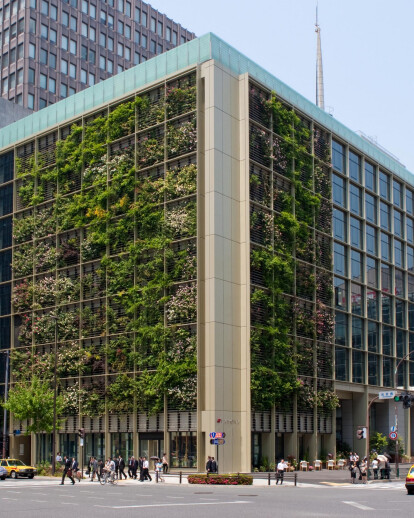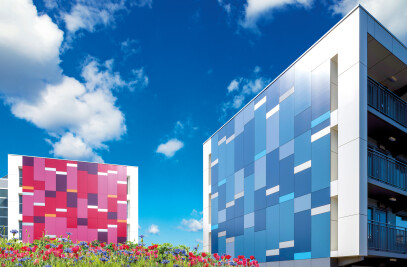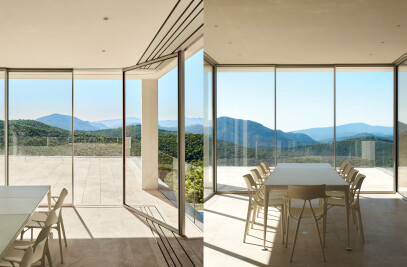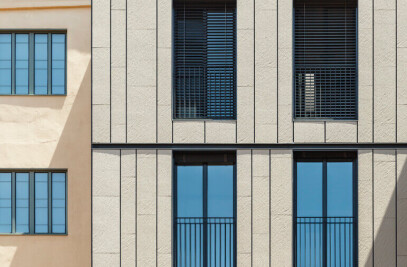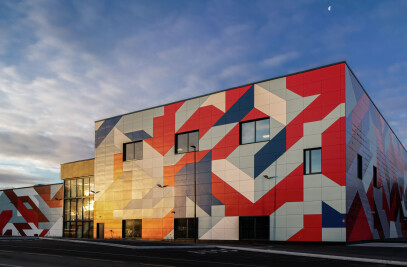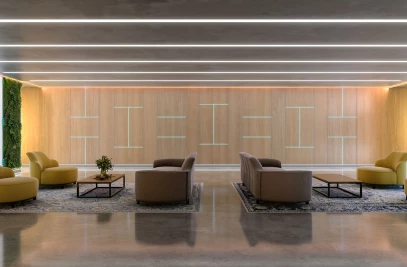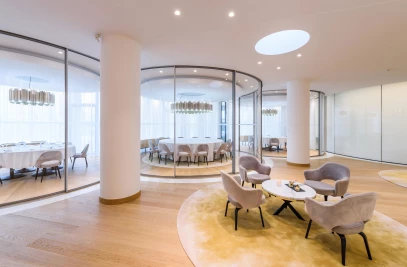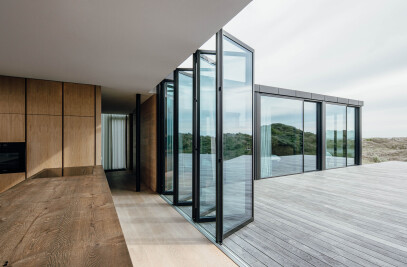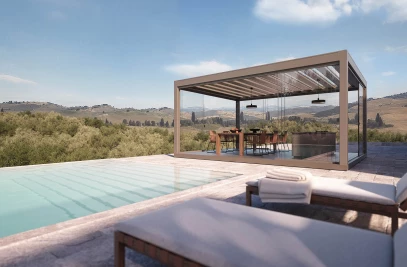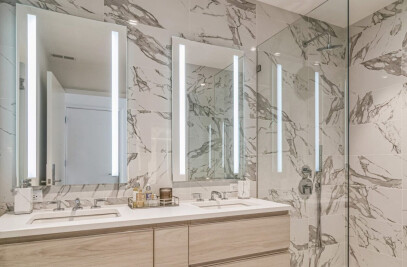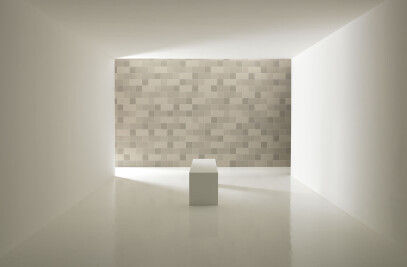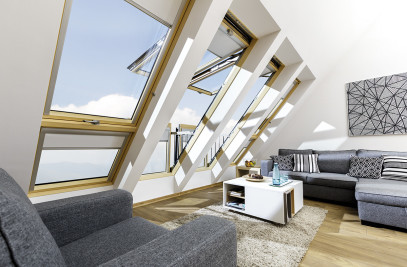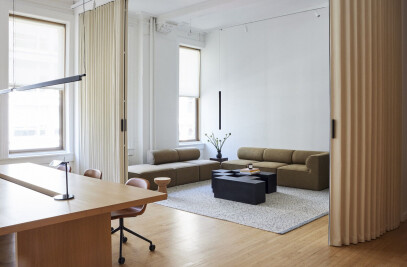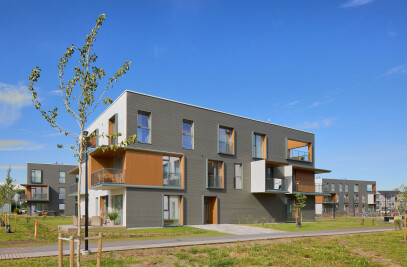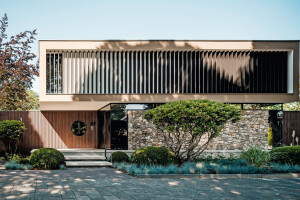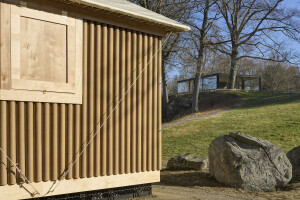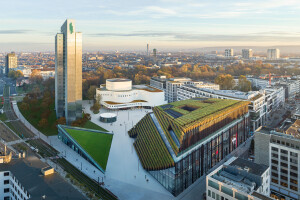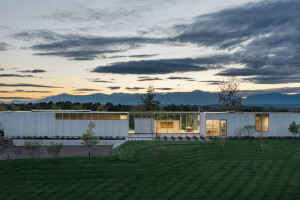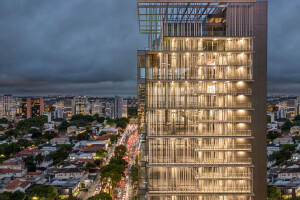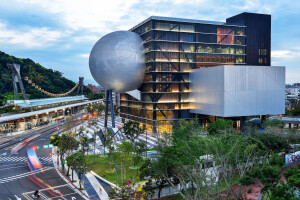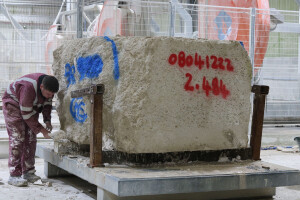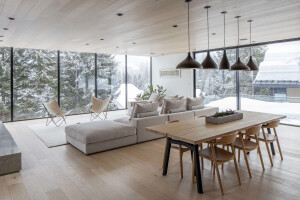Located in downtown Tokyo, Pasona HQ is a nine story high, 215,000 square foot corporate office building for a Japanese recruitment company, Pasona Group. Instead of building a new structure from ground up, an existing 50 years old building was renovated, keeping its building envelope and superstructure. The project consists of a double-skin green facade, offices, an auditorium, cafeterias, a rooftop garden and most notably, urban farming facilities integrated within the building. The green space totals over 43,000 square feet with 200 species including fruits, vegetables and rice that are harvested, prepared and served at the cafeterias within the building. It is the largest and most direct farm-to-table of its kind ever realized inside an office building in Japan.
The double-skin green facade features seasonal flowers and orange trees planted within the 3' deep balconies. Partially relying on natural exterior climate, these plants create a living green wall and a dynamic identity to the public. This was a significant loss to the net rentable area for a commercial office. However, Pasona believed in the benefits of urban farm and green space to engage the public and to provide better workspace for their employees. The balconies also help shade and insulate the interiors while providing fresh air with operable windows, a practical feature not only rare for a mid rise commercial building but also helps reduce heating and cooling loads of the building during moderate climate. The entire facade is then wrapped with deep grid of fins, creating further depth, volume and orders to the organic green wall.
Within the interior, the deep beams and large columns of the existing structure are arranged in a tight interval causing low interior ceiling of 7'-6". With building services passing below, some area was even lower at 6'-8". Instead, all ducts, pipes and their vertical shafts were re-routed to the perimeter, allowing maximum height with exposed ceilings between the beams. Lightings are then installed, hidden on the bottom vertical edge of the beams, turning the spaces between the beams into a large light cove without further lowering the ceiling. This lighting method, used throughout the workspace from second floor to 9th floor, achieved 30% less energy than the conventional ceiling mounted method.
Besides creating a better work environment, Pasona also understands that in Japan opportunities for job placement into farming are very limited because of the steady decline of farming within the country. Instead, Pasona focuses on educating and cultivating next generation of farmers by offering public seminars, lectures and internship programs. The programs empower students with case studies, management skills and financial advices to promote both traditional and urban farming as lucrative professions and business opportunities. This was one of the main reason for Pasona to create urban farm within their headquarters in downtown Tokyo, aiming to reverse the declining trend in the number of farmers and to ensure sustainable future food production.
Currently, Japan produces less than 1/3 of their grain locally and imports over 50 million tons of food annually, which on average is transported over 9,000 miles, the highest in the world. As the crops harvested in Pasona HQ are served within the building cafeterias, it highlights 'zero food mileage' concept of a more sustainable food distribution system that reduces energy and transportation cost.
Japan's reliance on imported food is due to its limited arable land. Merely 12% of its land is suitable for cultivation. Farmland in Pasona HQ is highly efficient urban arable land, stacked as a vertical farm with modern farming technology to maximize crop yields. Despite the increased energy required in the upkeep of the plants, the project believes in the long term benefits and sustainability in recruiting new urban farmers to practice alternative food distribution and production by creating more urban farmland and reducing food mileage in Japan.
Using both hydroponic and soil based farming, in Pasona HQ, crops and office workers share a common space. For example, tomato vines are suspended above conference tables, lemon and passion fruit trees are used as partitions for meeting spaces, salad leaves are grown inside seminar rooms and bean sprouts are grown under benches. The main lobby also features a rice paddy and a broccoli field. These crops are equipped with metal halide, HEFL, fluorescent and LED lamps and an automatic irrigation system. An intelligent climate control system monitors humidity, temperature and breeze to balance human comfort during office hours and optimize crop growth during after hours. This maximizes crop yield and annual harvests.
Besides future sustainability of farmers, Pasona HQ's urban farm is beyond visual and aesthetic improvement. It exposes city workers to growing crops and interaction with farmland on a daily basis and provides improvement in mental health, productivity and relaxation in the workplace. Studies show that most people in urbanized societies spend over 80% of their time indoors. Plants are also known to improve the air quality we breathe by carbon sequestration and removing volatile organic compound. A sampling on the air at Pasona HQ have shown reduction of carbon dioxide where plants are abundant. Such improvement on the air quality can increase productivity at work by 12%, improves common symptoms of discomfort and ailments at work by 23%, reduce absenteeism and staff turnover cost.
Employees of Pasona HQ are asked to participate in the maintenance and harvesting of crops with the help of agricultural specialists. Such activity encourages social interaction among employees leading to better teamwork on the job. It also provides them with a sense of responsibility and accomplishment in growing and maintaining the crops that are ultimately prepared and served to their fellow co-workers at the building's cafeterias.
Pasona Urban Farm is a unique workplace environment that promotes higher work efficiency, social interaction, future sustainability and engages the wider community of Tokyo by showcasing the benefits and technology of urban agriculture.
